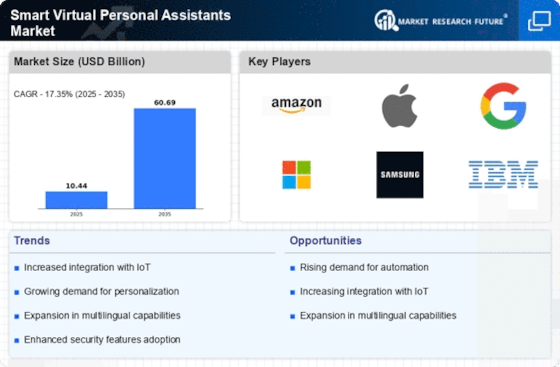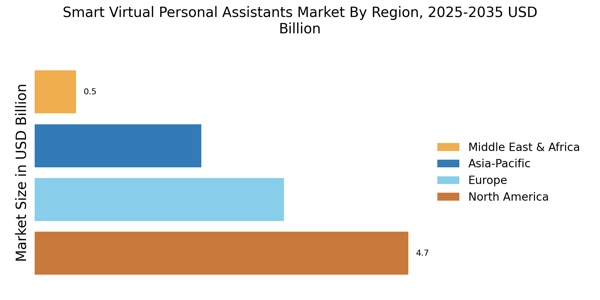Advancements in Artificial Intelligence
Advancements in artificial intelligence (AI) are significantly influencing the Smart Virtual Personal Assistants Market. The integration of sophisticated AI algorithms enables these assistants to understand and process natural language more effectively, thereby enhancing user interaction. Recent studies indicate that the AI segment within this market is expected to grow at a remarkable rate, driven by innovations in machine learning and natural language processing. These technologies allow virtual assistants to learn from user interactions, providing increasingly personalized experiences. As AI continues to evolve, it is likely to unlock new functionalities and applications for smart virtual personal assistants, making them more versatile and appealing to consumers. This ongoing evolution in AI capabilities is a critical driver for the Smart Virtual Personal Assistants Market, as it shapes the future of user engagement and satisfaction.
Growing Adoption of Smart Home Ecosystems
The Smart Virtual Personal Assistants Market is being propelled by the growing adoption of smart home ecosystems. As consumers increasingly integrate smart devices into their homes, the demand for virtual assistants that can seamlessly control these devices is on the rise. Market data suggests that the smart home market is expanding rapidly, with projections indicating a significant increase in the number of connected devices in households. This trend creates a fertile ground for smart virtual personal assistants, which serve as central hubs for managing various smart home functionalities. The ability to control lighting, security systems, and appliances through voice commands enhances user convenience and efficiency. Consequently, the integration of smart virtual personal assistants into home automation systems is likely to drive further growth in the Smart Virtual Personal Assistants Market.
Expansion of Multi-Functional Capabilities
The Smart Virtual Personal Assistants Market is witnessing an expansion of multi-functional capabilities, which is driving consumer interest and adoption. Modern virtual assistants are evolving beyond basic task management to offer a wide array of functionalities, including scheduling, information retrieval, and even entertainment options. Market analysis indicates that consumers are increasingly looking for comprehensive solutions that can cater to various needs within a single platform. This trend is prompting developers to innovate and enhance the capabilities of their virtual assistants, making them more versatile and appealing. As these assistants become more integrated into daily life, their ability to perform multiple functions is likely to be a key differentiator in the market. Consequently, the expansion of multi-functional capabilities is expected to play a pivotal role in shaping the future of the Smart Virtual Personal Assistants Market.
Rising Demand for Voice-Activated Technology
The Smart Virtual Personal Assistants Market is experiencing a notable surge in demand for voice-activated technology. This trend is largely driven by the increasing adoption of smart devices, which are becoming ubiquitous in households and workplaces. According to recent data, the market for voice recognition technology is projected to reach substantial figures, indicating a robust growth trajectory. Consumers are increasingly seeking hands-free solutions that enhance convenience and efficiency in daily tasks. As a result, companies are investing heavily in developing advanced voice recognition capabilities, which are integral to the functionality of smart virtual personal assistants. This rising demand not only reflects changing consumer preferences but also suggests a shift towards more intuitive and user-friendly technology, thereby propelling the Smart Virtual Personal Assistants Market forward.
Increased Focus on User Privacy and Data Security
In the Smart Virtual Personal Assistants Market, there is an increasing focus on user privacy and data security. As consumers become more aware of data protection issues, companies are compelled to enhance the security features of their virtual assistants. Recent surveys indicate that a significant percentage of users express concerns regarding data privacy, which has led to a demand for transparent data handling practices. In response, many companies are implementing robust security measures and privacy policies to build consumer trust. This heightened emphasis on privacy not only addresses user concerns but also positions companies favorably in a competitive market. As privacy becomes a critical factor in consumer decision-making, the Smart Virtual Personal Assistants Market is likely to see a shift towards solutions that prioritize data security, thereby influencing purchasing behavior.

















